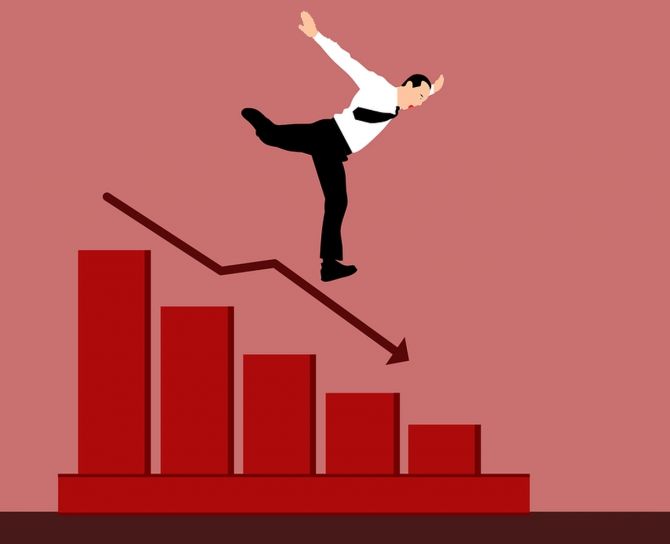'The finance ministry and the RBI will never admit to the difficulties in the economy because if they do so, it will adversely impact the financial markets, etc.'
'They like to present a rosy picture that everything is fine and under control.'

High inflation. Unemployment. Falling exports. High trade deficit. Worries of an impending recession. Unorganised sector suffering.
These are the points taken up by the Opposition in Parliament.
Record GST collections. Rise in personal income tax collections. Impressive growth in the organised sector.
Finance Minister, Nirmala Sitharaman -- who incidentally turns 63 today, August 16 -- countered the opposition with these arguments.
Who is right?
Professor Arun Kumar, retired professor of economics JNU, and author of many books on the economy, discusses the present Indian and global economic scenario in a interview with Shobha Warrier/Rediff.com. Part 1 of a two-part interview:
In Parliament, Finance Minister Nirmala Sitharaman categorically declared India was not getting into recession or stagflation.
The finance ministry and the RBI will never admit to the difficulties in the economy because if they do so, it will adversely impact the financial markets, etc.
They like to present a rosy picture that everything is fine and under control.
When they say we are not in stagflation, they are only looking at the data on the organised sector, and not the unorganised sector.
It is not just that the unorganised sector is not independently taken into account while announcing the quarterly GDP data, even for the organised sector, only a limited of data are available. So, this data does not give the true picture of the economy.
For example, it is assumed that the target of the agricultural sector will be fulfilled. It is only an assumption.
The fact is that because of the early summer in March and April 2022, the wheat crop, the tomato crop, citrus crop, etc. got affected.
So, data on agriculture's contribution to GDP is not correct. The assumption that the sector is growing at 3% is incorrect.
Data from the rest of the unorganised sector usually comes once in five years.
In between, it is assumed that the unorganised sector is behaving like the organised sector and the latter can proxy for the former.
But it doesn't...
Yes, it doesn't. We know that since demonetisation hit the unorganised sector hard, it is declining, while the organised sector has grown.
You cannot represent a declining sector with a rising sector. It is methodologically incorrect. There is evidence for that.
Take e-commerce for example, it has been growing at 30%-40%.
When the economy is stagnant and e-commerce is growing at 30%-40%, it means the retail in the unorganised sector would be declining. The demand in the neighbourhood stores has gone down.
Because of such shift in demand, the profits of the organised sectors are shooting up by 20%-24%.
That's because their pricing power has gone up since their monopoly in the market has increased. And that is because the unorganised sector has declined.
Further, consumption has not recovered to the pre-pandemic levels as per even the official data.
The RBI's consumer confidence index was 104 before the pandemic which went down to 40 during the pandemic, and now risen to 72. So, consumer confidence is not back.

IMAGE: Professor Arun Kumar.
Does that mean what the government is saying is only half-truth?
Not even half-truth! They are ignoring a lot of data.
When the RBI says consumer confidence is at 72, 30% less than what it was in 2019, they are only accounting for the organised sector. What would it be for the economy as a whole?
If consumption has not revived, how can growth revive?
So, the rate of growth of the economy is not 7.5% as claimed by the government but it is 1% or 0% when you independently take into account the unorganised sector, including the agricultural sector.
So, we are already into stagflation and headed to recession.
The economy is stagnant but prices are rising very fast. That's what is stagflation is.
The inflation rate that was 5.13% in 2021 has gone up to 7.7% in 2022...
This is the inflation rate measured by CPI, and it keeps changing. Currently there is high inflation.
More than the CPI, the wholesale price index (WPI) is rising at more than 15%.
This high rate will lead to a rise in the CPI too. The fact is, both are very high now.
This hurts the unorganised sector hard since the wages are not indexed and they lose purchasing power.
So, what we have is, high inflation and no growth or likely negative growth. That's why we call it stagflation.
Because the RBI is raising the interest rate, demand will go down further.
When demand falls further, the economy will slip further and the rate of growth will become negative.
The global economy is also headed into recession.
It means demand for export will go down. Then India's rate of growth will further go down.
It was reported that the trade deficit is already at an all-time of high of $31 billion and exports fell by 12% in July...
That's why I am saying our rate of growth will fall further.
When the rate of growth falls further, we will be into recession.
So, both the RBI's action of raising interest rates, and the global recession are going to result in a recession in our economy in the coming months.
The United States of America is already in a recession and our exports have already fallen. How is it going to affect the Indian economy in the coming months?
The rupee will weaken further when foreign exchange reserves decline.
As the rupee weakens, the imported items will become more expensive and inflation will go up further.
When the reserves start falling sharply, speculation on rupee will take place.
Then the exporters will slow down bringing their earnings back to India and the importers will start importing quickly. The NRIs will start withdrawing their money.
These trends will lead to the reserves depleting further.
Feature Presentation: Rajesh Alva/Rediff.com












 © 2025
© 2025